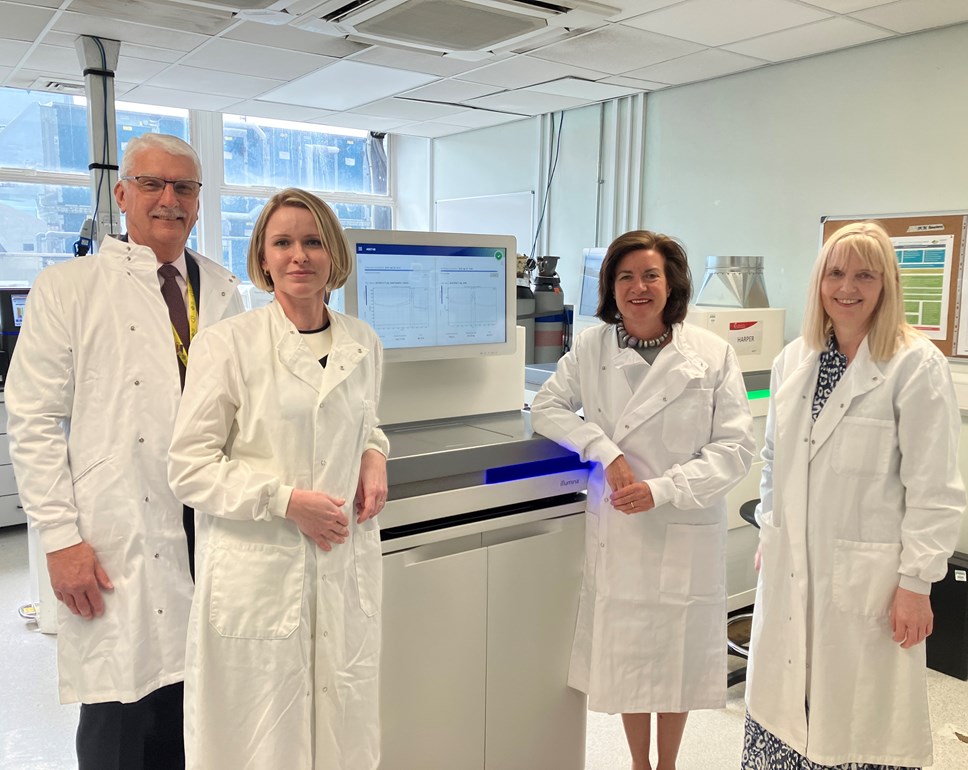
New test to revolutionise lung cancer diagnosis rolled out in Wales.
Cyflwyno prawf newydd yng Nghymru i chwyldroi diagnosis o ganser yr ysgyfaint
An innovative liquid biopsy blood test to improve lung cancer treatment could help more people in Wales.
Lung cancer is the fourth most common cancer in Wales and the leading cause of cancer deaths. By increasing the use of non-invasive liquid biopsy (blood sample) at an earlier stage of the cancer pathway, targeted treatments can be decided and administered quicker, improving patient outcomes and survival rates.
Made possible through the All-Wales Medical Genomics Service (AWMGS), Illumina technology, Life Sciences Hub Wales, and investment from multiple partner organisations, the new use of the blood test can detect multiple cancer markers without needing an invasive tissue biopsy.
This new study will evaluate the benefits of liquid biopsy in people with suspected lung cancer. It will look at how its use earlier in the diagnostic process can improve and speed up diagnosis, reduce the time between diagnosis and treatment, and eventually inform how this technology can be rolled out to people with other types of suspected cancer.
Liquid biopsy as a tool in genomic medicine is expected to become a pivotal part of healthcare and provide a better understanding of illnesses, improve patient outcomes and transform lives. In the future it has the potential to provide a simple, accessible and reliable means of investigating suspected cancer and less invasive monitoring for cancer recurrence.
Testing the use of emerging technologies such as liquid biopsies is one example of how the Welsh Government plans to transform diagnostic services in Wales, as set out in the Diagnostic Strategy for Wales, launched today [25th April]. This strategy will deliver services to reduce waiting times for diagnostic tests, improve patient outcomes, and support the diagnostic workforce across our NHS in Wales.
The Minister for Health and Social Services, Eluned Morgan said:
“Wales has been leading the way in how we integrate genomic testing into health services to revolutionise how we deliver healthcare. Liquid biopsies could deliver real benefits for patients in Wales and save lives by helping us detect and treat cancers earlier.
“This is a key example of how working in partnership across a variety of sectors can contribute to improved health outcomes. This is part of our wider work to recover and transform services through the Diagnostic Strategy for Wales.”
Craig Maxwell, patient representative of the QuicDNA steering group said:
“Being diagnosed at 40 with incurable and inoperable EGFR lung cancer I have first-hand experience with the cancer diagnostic pathway in Wales. Wales is so lucky to have amazing nurses and doctors who support us through this pathway, we all have a responsibility to make sure they have the best and most up-to-date technology available to them to support the diagnostic pathway. This clinical study is a major step forward in helping cancer patients, like myself.
From the point of discovering my tumour, it took a stressful and hard 72 days to identify my cancer but this new technology will help support and deliver results quicker, allowing cancer patients to get treatment sooner and help them plan, with their families for the new life that exists in front of them. Let’s make sure all of Wales has access to these new innovative tests, and our amazing nurses and doctors have access to this technology to help them help us.”
ENDS
Notes to editors
Notes
This is the first time this test has been analysed in-house in the NHS.
A very limited liquid biopsy test is already offered by AWMGS to a small number of people where tissue biopsy material is not available.
The clinical study will involve 1260 patients who are being investigated for suspected stage III and IV lung cancer. Patients will have a liquid biopsy test in addition the standard diagnostic tests (e.g. tissue biopsy and tissue genomic profiling).
Full list of organisations involved.
- The All Wales Medical Genomics Service (AWMGS)
- Genomics Partnership Wales.
- Health and Care Research Wales
- Centre for Trials Research
- Aneurin Bevan University Health Board
- Cardiff and Vale University Health Board
- Life Sciences Hub Wales
- Wales Cancer Network
- Moondance Cancer Initiative
- Tenovus Cancer Care
- Amgen (through Collaborative Working Agreement)
- Illumina (through Collaborative Working Agreement)
- AstraZeneca (through Donation & Grants)
- Bayer (through Donation & Grants)
- Lilly (through Donation & Grants)
In Wales, lung cancer is the third most common cancer in women and the fourth most common cancer in men. However, it is the most common cause of cancer death overall. The majority of patients are diagnosed with advanced stage (stage 3 and 4) disease. There is only a 16% one-year survival rate for patients with stage 4 disease.
Diagnostic Strategy for Wales attached.
